Potential use of wastewater in agriculture
DOI:
https://doi.org/10.29312/remexca.v12i1.2789Keywords:
risks, treatments, use in agriculture, wastewaterAbstract
The contamination of water, air, soil and food is a collateral consequence of the activities that man has developed to live and improve his quality of life. The development of the human being, its continuous growth since the time of the industrial revolution has left damage and degradation in natural resources. In its demographic, scientific and technological growth, human beings have not made sufficient efforts to sustainably preserve natural resources. Among these resources, water is one of the most essential and vital for all forms of life, but every day the resource is scarcer in a healthy way. Due to multiple factors associated with population growth, urbanization and industrialization, all equally direct and indirect causes of climate change. Treating and using wastewater is challenging because that is often the only option farmers have. Thus, these waters represent a valuable resource, both from an economic and environmental point of view (conservation of water resources, recycling of nutrients). Currently, about 80% of wastewater is disposed of without treatment and is used for agricultural irrigation, representing a significant sanitary problem (due to the presence of pathogenic and toxic elements).
Downloads
Published
How to Cite
Issue
Section
License
Copyright (c) 2021 Revista Mexicana de Ciencias Agrícolas

This work is licensed under a Creative Commons Attribution-NonCommercial 4.0 International License.
The authors who publish in Revista Mexicana de Ciencias Agrícolas accept the following conditions:
In accordance with copyright laws, Revista Mexicana de Ciencias Agrícolas recognizes and respects the authors’ moral right and ownership of property rights which will be transferred to the journal for dissemination in open access. Invariably, all the authors have to sign a letter of transfer of property rights and of originality of the article to Instituto Nacional de Investigaciones Forestales, Agrícolas y Pecuarias (INIFAP) [National Institute of Forestry, Agricultural and Livestock Research]. The author(s) must pay a fee for the reception of articles before proceeding to editorial review.
All the texts published by Revista Mexicana de Ciencias Agrícolas —with no exception— are distributed under a Creative Commons License Attribution-NonCommercial 4.0 International (CC BY-NC 4.0), which allows third parties to use the publication as long as the work’s authorship and its first publication in this journal are mentioned.
The author(s) can enter into independent and additional contractual agreements for the nonexclusive distribution of the version of the article published in Revista Mexicana de Ciencias Agrícolas (for example include it into an institutional repository or publish it in a book) as long as it is clearly and explicitly indicated that the work was published for the first time in Revista Mexicana de Ciencias Agrícolas.
For all the above, the authors shall send the Letter-transfer of Property Rights for the first publication duly filled in and signed by the author(s). This form must be sent as a PDF file to: revista_atm@yahoo.com.mx; cienciasagricola@inifap.gob.mx; remexca2017@gmail.
This work is licensed under a Creative Commons Attribution-Noncommercial 4.0 International license.



